Greenpeace to new Plastics Treaty talks Chair: Restore trust, transparency and ambition
Greenpeace International
Geneva, Switzerland – Following the election of HE Ambassador Julio Cordano of Chile as the new Chair of the committee tasked with negotiating a global plastics treaty, Greenpeace International said the appointment must mark a turning point for the Global Plastics Treaty talks and the start of a renewed effort to rebuild trust in the process. The election took place today during the third installment of the Intergovernmental Negotiating Committee’s (INC) fifth meeting (INC5.3). Graham Forbes, Greenpeace Head of Delegation to the Global Plastics Treaty negotiations and Global Plastics Campaign Lead for Greenpeace USA, said: “Ambassador Cordano inherits a treaty negotiation process under strain. We have lost precious time since the negotiations began while the plastics crisis worsens by the day. We urge the new chair to rally world leaders to deliver a strong and effective agreement that puts people and the planet first. No more excuses. This is a once-in-a-generation opportunity to protect human health, our climate system and global biodiversity from toxic pollution, and initiate a new era of global innovation. “Around the world, billionaires and corporate interests are challenging democratic institutions and undermining global cooperation. Effective multilateralism is a necessary condition of human survival. It is time for governments that understand this to step up to the challenge and deliver the Global Plastics Treaty that justice and science demand.” ENDS Photos are available in the Greenpeace Media Library. Contacts: Angelica Carballo Pago, Global Plastics Communication and Media Lead, Greenpeace USA, apago@greenpeace.org, +63917 1124492 Greenpeace International Press Desk, +31 (0) 20 718 2470 (available 24 hours), pressdesk.int@greenpeace.org (299 mots)
Greenpeace Pictures of the Week
Marlon Marinho
Jane Fonda at a Greenpeace Premiere in the US, the OILympics in Milan, and protests against Shell and ICE, here is some of Greenpeace’s work from around the world this week. United States – GASLIT, Greenpeace USA’s first feature film featuring Academy Award-winning actor and activist Jane Fonda, premieres at the 41st Santa Barbara International Film Festival on 5 February 2026. Directed by Katie Camosy, GASLIT is both a call to action and a reflection on the decades-long struggle between fossil fuel profiteering and the survival of frontline communities. Camosy and Fonda were joined at the premiere by film participants and Texas/Gulf Coast community advocates Jenny Espino and Diane Wilson, as well as award-winning actor Connie Britton. Italy- Hard-hitting video highlighting the absurdity of Italian oil and gas giant Eni’s sponsorship of the Milano Cortina Winter Olympic Games, as one of the corporations stealing our winters through its planet-heating pollution. This satirical video, created by Studio Birthplace, shows speed skaters, skiers and bobsledders racing along, with Eni logos prominent. Suddenly a trickle of oil turns into a tsunami, sweeping the athletes off their feet, causing them to slip and crash as a sea of oil washes over them. One year of Eni’s emissions could melt enough glacier ice to fill 2.5 million Olympic swimming pools, demonstrating the corporation’s central role in the climate crisis that threatens the future viability of the Games and winter sports. Canada – Greenpeace activists unveiled a banner saying “No Canadian Arms for ICE” at the Brampton headquarters of the Canadian company that is building armoured vehicles for the U.S. Immigration and Customs Enforcement (ICE), as they called on all federal Members of Parliament to support the legislation before Parliament that would tighten restrictions on arms exports. Italy – Greenpeace Italy activists took action in front of Milan’s Duomo to protest ENI, a major partner of the Milan-Cortina Olympic Games. Its uncontrolled emissions are fueling the climate crisis, threatening the survival of glaciers and snowpack, and thus the Winter Olympics themselves. Activists placed an artifact depicting the Olympic rings soaked in oil, illustrating how polluting companies are also polluting the Olympic Games with their greenwashing. United Kingdom – Greenpeace UK activists stage a protest outside Shell’s London HQ, holding giant figures comparing Shell’s annual profit with the UK’s 2025 bill for damages caused by extreme weather following the oil giant’s profit announcement. United Kingdom – Greenpeace activists take over a billboard in London in solidarity with American citizens impacted by ICE, drawing the parallel to the climate crisis; as the climate breakdown is already the leading driver of migration worldwide. Greenpeace has been a pioneer of photo activism for more than 50 years, and remains committed to bearing witness and exposing environmental injustice through the images we capture. To see more Greenpeace photos and videos, visit our Media Library. Texte intégral (1403 mots)


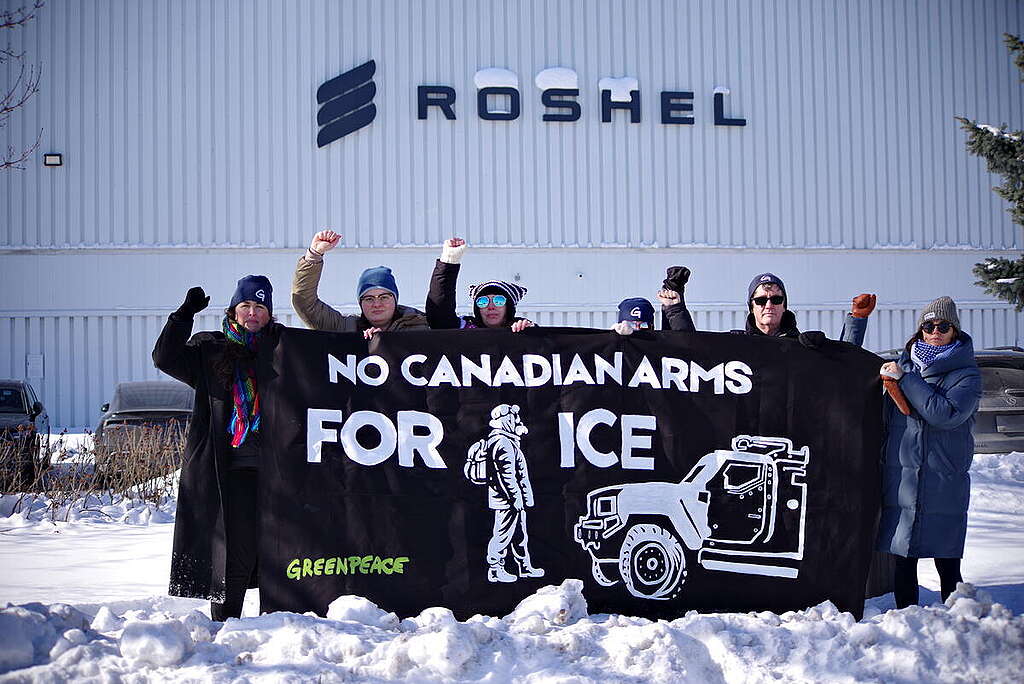
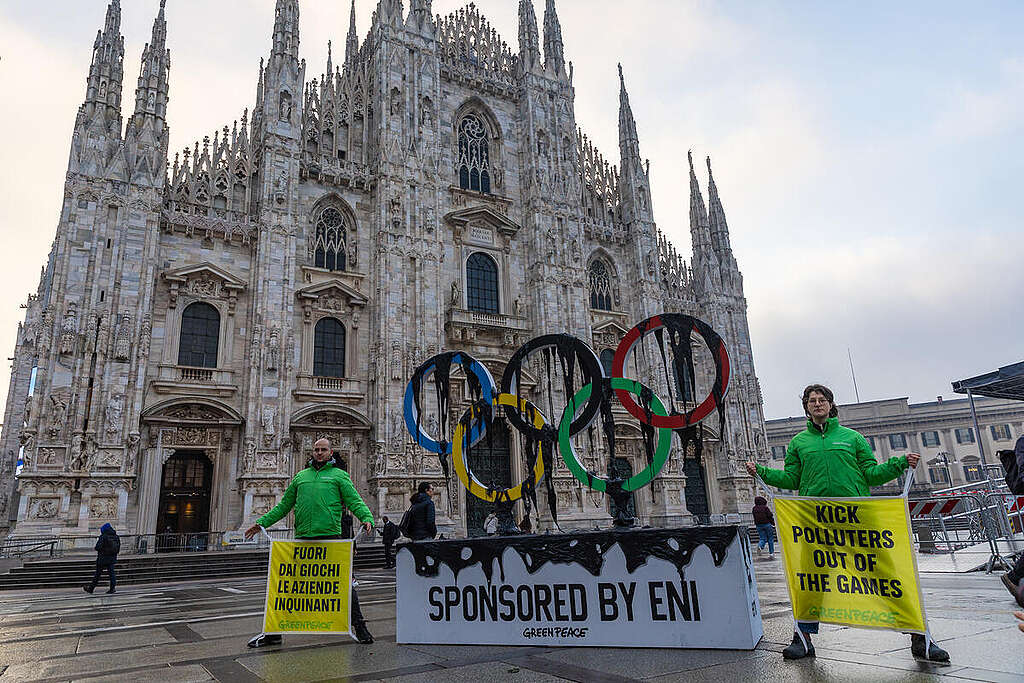
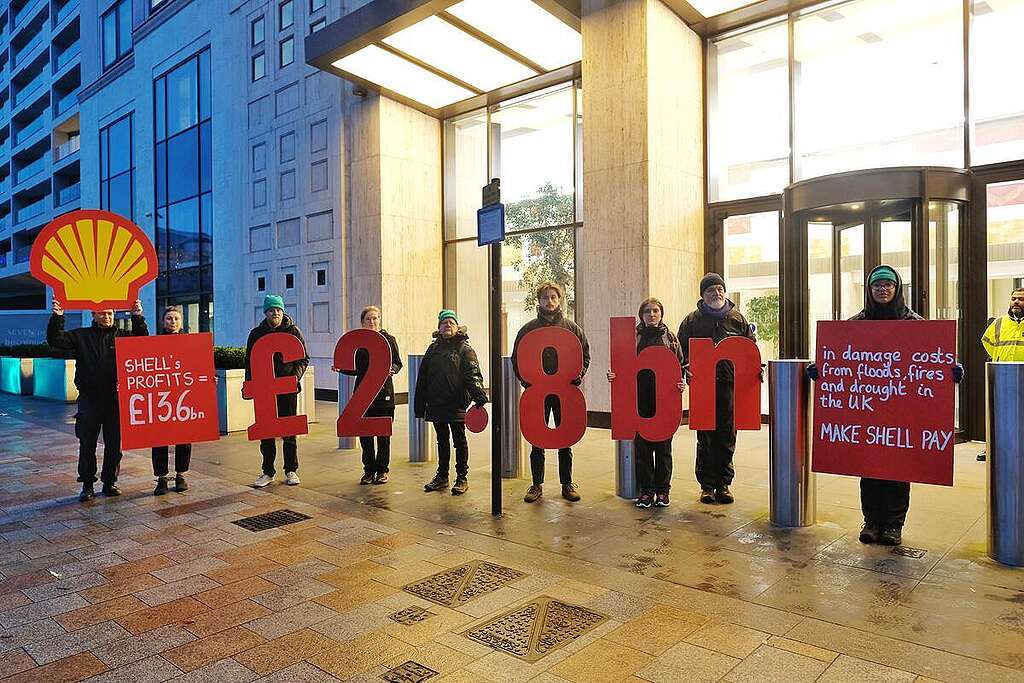
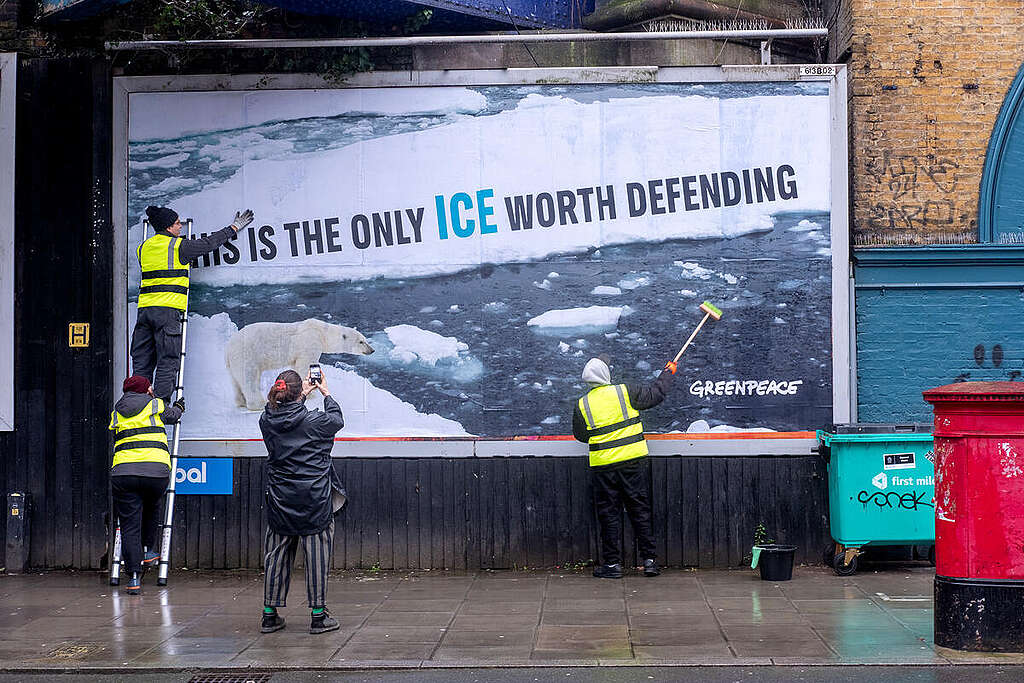
The UN Tax Convention could be a game-changer. So why is ambition still stuck in first gear?
Clara Thompson
If you’ve been following global climate and finance politics lately, you’ll have noticed a strange contradiction. On the one hand, governments keep telling us we need more climate finance, fairer taxation, and new public resources to deal with climate breakdown, inequality and crumbling public services. On the other hand, when it comes to the one global forum designed to actually fix international tax rules – the UN Tax Convention – that bold ambition doesn’t translate. These negotiations, currently underway in New York, present a unique chance to hold corporate tax avoiders and polluters accountable, unlocking trillions in public funds for climate action, nature protection, and vital public services. Instead of rising to that moment, however, the process risks failing to deliver the transformative change many countries are calling for. Same governments. Same problems. Very different energy. So what’s going on? The latest draft of the UN Tax Convention includes articles on sustainable development and taxing high-net-worth individuals (HNWI). That’s good news. A few years ago, neither would even have made it into the room. But here’s the catch: they’re still written mostly as ‘principles’, not commitments. The sustainable development article remains declaratory. It acknowledges that tax cooperation should support social, economic and environmental goals, without spelling out how, or what kinds of mechanisms would be needed to deliver them. No change to this article since the Terms of Reference were set out. The article on high-net-worth individuals has improved on paper (it uses ‘shall’ instead of ‘agree’ now), but still stops short of what’s actually needed to tax extreme wealth effectively and fairly. In short: governments agree that something should happen, but appear reluctant when it comes to the details of how to actually make it happen. That’s like agreeing to catch smugglers, but banning customs from opening the luggage. This is where things get awkward. In other international forums (COP30, G20, FfD4 to name a few examples), many of the same governments are already making much bolder statements. For example: In 2025, at the Fourth International Conference on Financing for Development (FfD4) in Seville, Spain, governments committed to improving tax cooperation and transparency, explicitly referencing progressive taxation to fund social protection and integrate undeclared wealth, and in written submissions, countries such as Brazil, Colombia, Germany, France, Spain and Sierra Leone have explicitly supported stronger cooperation on HNWI taxation in the UN process. Many African countries, including Zambia and Nigeria, have repeatedly highlighted in their plenary interventions how our broken global tax system undermines development and climate action. Since the UN Tax Convention negotiations began in 2025, at least 17 countries have made supportive statements for more detail to be added on the issue of sustainable development, several of whom have explicitly endorsed inclusion of environmental taxation and the polluter pays principle. And yet, when negotiations move from statements to drafting, ambition narrows. Not all elements raised in countries’ submissions find their way into the Chair’s text, and several governments continue to defer to high-level, non-committal language. Political choices are reframed as technical questions by some countries, while the potential of the Convention to support climate action and sustainable development through tax policy remains underexplored. Issues with clear distributional complexities are quietly treated as beyond the Convention’s scope. Whenever ambition stalls, one word inevitably appears: sovereignty. We’re told that taxing the super-rich is a domestic issue. That coordinated standards on taxing polluters would infringe national autonomy. That global rules somehow threaten democratic choice. But here’s the inconvenient truth: there is nothing sovereign about a tax system you can’t enforce. Here’s the problem: in today’s world, money, profits, and assets move faster than national laws, often through loopholes and tax havens, and across borders, while information about these assets does not. Countries trying to take action alone end up competing with each other, lowering standards, and losing billions in the process. These are funds that could have supported climate finance and sustainable development. Real sovereignty isn’t the right to say “no” alone. It’s the ability to withstand pressure together to enforce rules that protect public resources and the planet. This is why we need global tax reform. We’re living through a rupture, not a transition. The old era of club-based tax governance (dominated by a handful of rich OECD countries) is cracking under its own contradictions. At the same time, multilateralism itself is under attack, with institutional deadlock and unilateral action increasingly replacing cooperation, from the UN Security Council to climate negotiations. That’s precisely why the UN Tax Convention matters. It’s the only forum in international tax governance where every country has a seat, decisions aren’t hostage to unanimity, and tax cooperation can be anchored in sustainable development, not just capital mobility. In short: it’s the one place where we can move from fair taxation by permission to fair taxation by right. Hey reader, if you’ve reached this point it means this is a topic you’re really interested in, and we would like to know who you are, so please leave a comment below and share your thoughts! If the Convention is to live up to its mandate, four things need to happen: The tools exist. The political arguments are already being made elsewhere. And the costs of inaction are painfully visible. What’s missing isn’t expertise – it’s alignment. If governments are serious about climate justice, social cohesion and sustainable development, the UN Tax Convention is not the place to be cautious. It’s the place to be honest. Because in a world where crises are global and wealth is mobile, collective action isn’t a loss of sovereignty – it’s the only way to reclaim it. And yes, taxing the super-rich and corporate polluters is part of that story. Together, let’s urge governments to tax the super-rich and fund a green and fair future. Clara Thompson is the Global Tax Justice Lead at Greenpeace International. She is currently in New York City for the 4th round of negotiations of the United Nations Treaty on International Tax Cooperation (also known as the UN Tax Convention). Texte intégral (2501 mots)
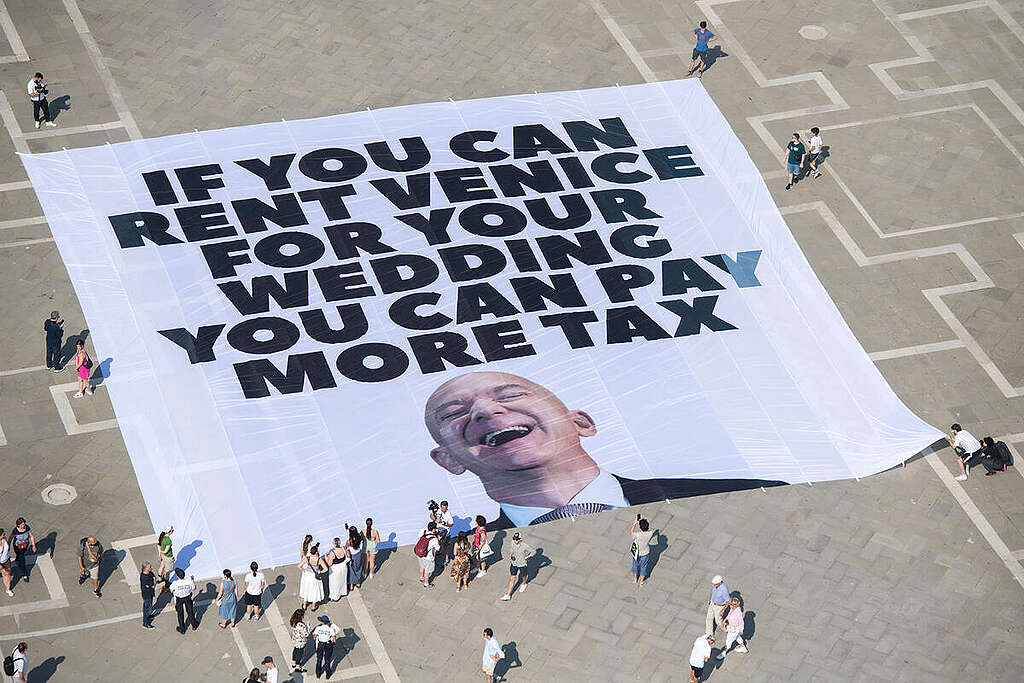
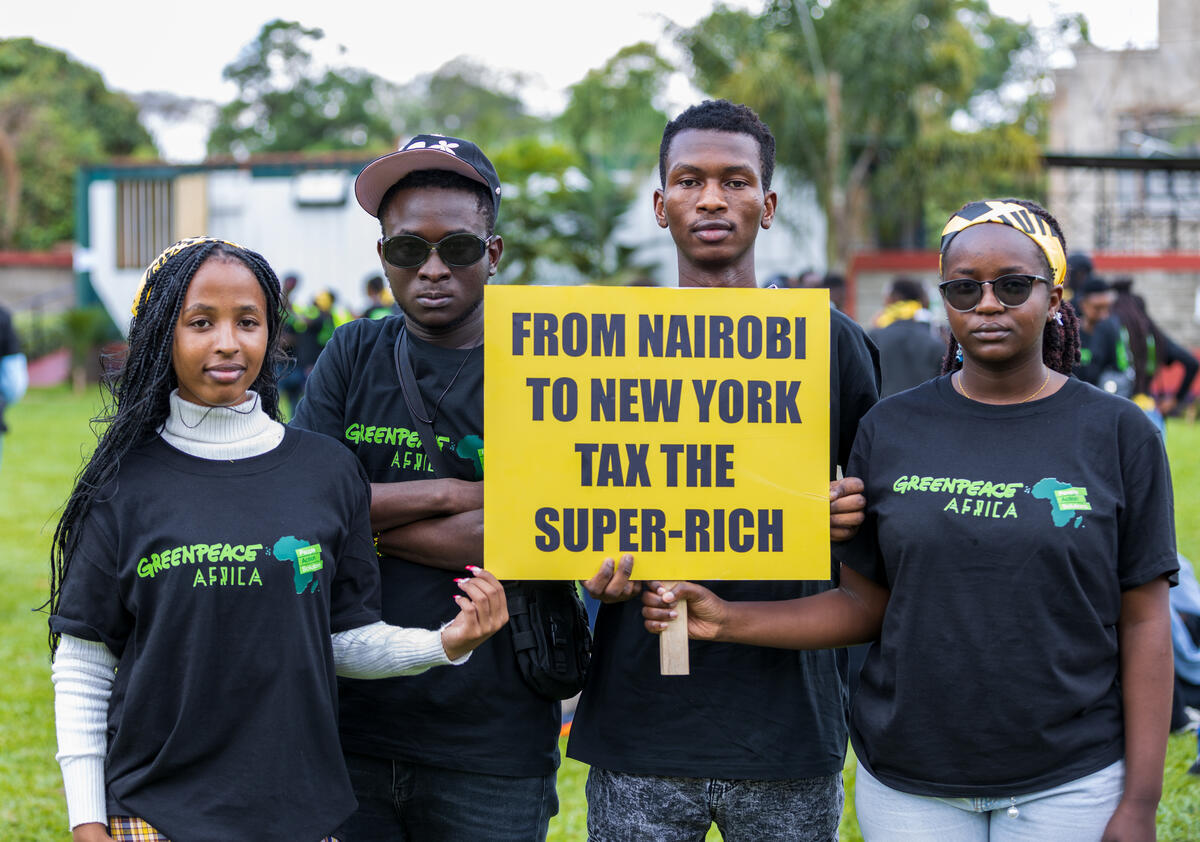
Principles everywhere, commitments nowhere
The paradox no one wants to name
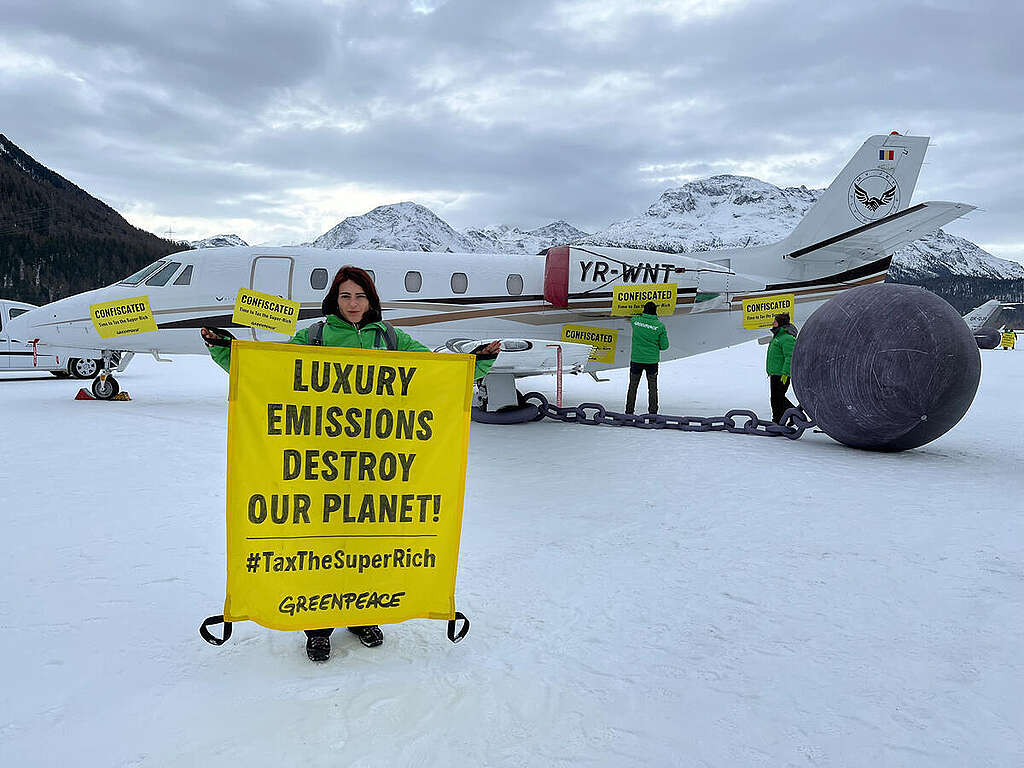
Sovereignty: the most misused word in the room
Why the UN Tax Convention matters more than ever
What needs to change
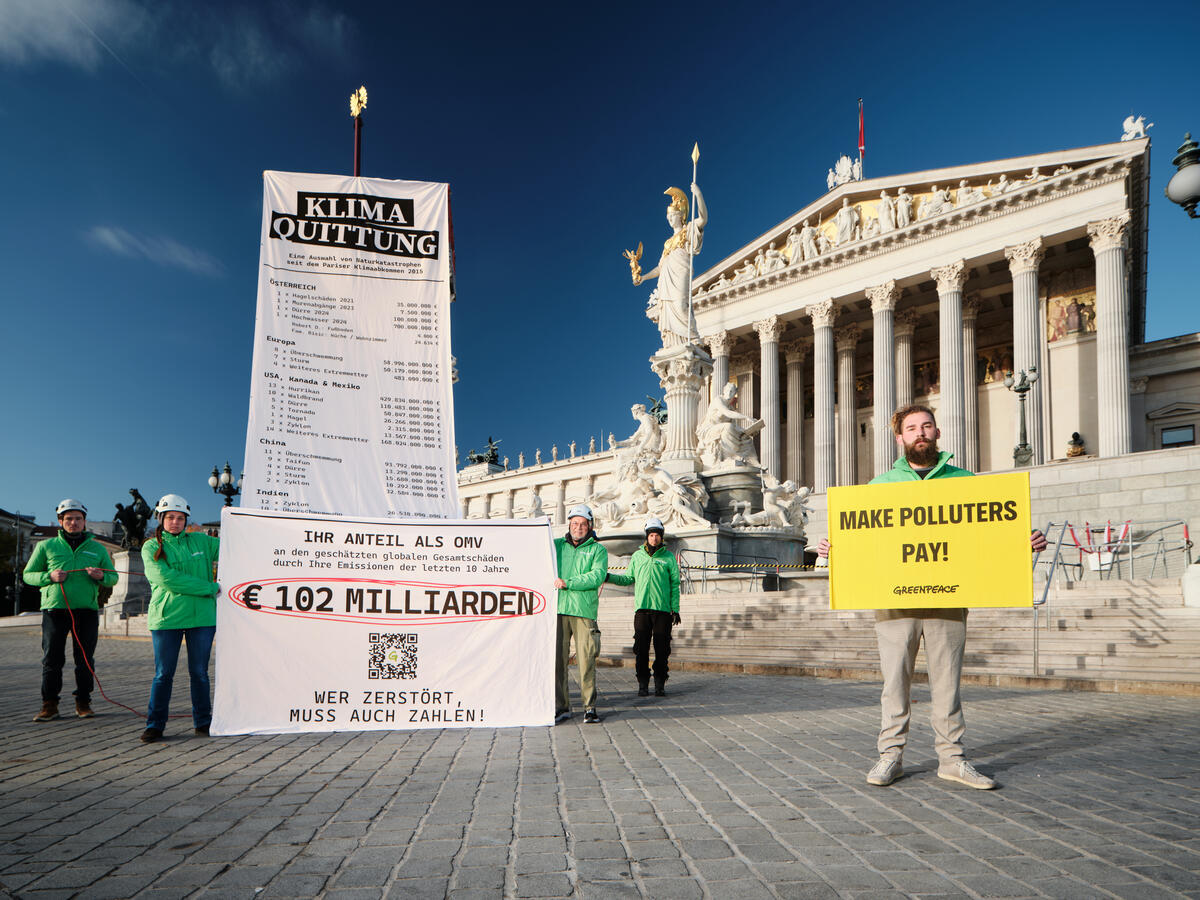
The moment we stop pretending

Greenpeace Italy unveils Olympic rings leaking oil in Milan to call out fossil fuel sponsorship of Winter Games
Greenpeace International
Milan, Italy – This morning, Greenpeace Italy activists placed a large installation depicting the Olympic Rings dripping oil and the words “Sponsored by Eni” in Piazza Duomo in Milan, where the Olympic flame is expected to arrive today. Activists displayed banners reading “Kick polluters out of the Games”, in a protest against one of the Games’ major sponsors, Italian oil and gas giant Eni, whose greenhouse gas emissions threaten winters as they are currently known and the Winter Olympics and Paralympics themselves. Photos and videos of the Greenpeace Italy protest can be downloaded via the Greenpeace Media Library Greenpeace Italy climate campaigner Federico Spadini said, “It’s absurd that the Olympics and Paralympics are partnering with corporations whose emissions threaten the ice and snow that winter sports depend on. Oil and gas companies like Eni are driving the climate crisis, and it is unacceptable that its greenwashing operations have been allowed to tarnish the Olympic values of respect for people and the environment. That’s why Greenpeace is calling for the International Olympic Committee to drop oil and gas sponsorship from the Winter Olympic and Paralympic Games and commit to ending fossil fuel sponsorship across all Olympic Games.” According to recent analysis based on scientific modelling, Eni’s annual emissions could melt enough glacier ice to fill 2.5 million Olympic swimming pools.[1] In recent days, Greenpeace Italy and Greenpeace International sent an open letter to the International Olympic Committee (IOC) asking it to ban fossil fuel sponsorships, building on its legacy of banning tobacco advertising in 1988.[2] Greenpeace Italy has also released a video denouncing Eni’s impact on the Winter Games, featuring the same image of the Olympic Rings dripping oil, as that used in the Milan installation. ENDS Photos and videos of the Olympics Rings installation in Milan can be downloaded via the Greenpeace Media Library Notes: [1] https://www.nature.com/articles/s41558-018-0093-1 [2] The open letter to the International Olympic Committee Watch Greenpeace Italy’s Oilympics video here Contacts: Gaia Maione, Press Office Greenpeace Italy, +39 340 571 8019, gmaione@greenpeace.org Martin Zavan, Communications Specialist, Greenpeace International, +61 424 295 422, mzavan@greenpeace.org Greenpeace International Press Desk: +31 (0)20 718 2470 (available 24 hours), pressdesk.int@greenpeace.org Texte intégral (555 mots)
Bon Pote
Actu-Environnement
Amis de la Terre
Aspas
Biodiversité-sous-nos-pieds
Bloom
Canopée
Décroissance (la)
Deep Green Resistance
Déroute des routes
Faîte et Racines
Fracas
F.N.E (AURA)
Greenpeace Fr
JNE
La Relève et la Peste
La Terre
Le Lierre
Le Sauvage
Low-Tech Mag.
Motus & Langue pendue
Mountain Wilderness
Negawatt
Observatoire de l'Anthropocène
